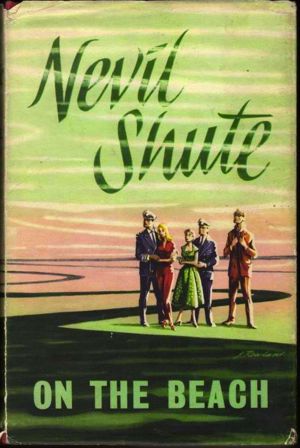The human spirit thrives on hope. I think the King James translators put it best (if not a bit inaccurately) when they wrote: and on earth peace, goodwill toward men. Humans have wanted and longed for peace and utopia ever since one person set him or herself above another.
Persecution and oppression always produce in those persecuted and oppressed the hope that there will come a day when persecutions will end and oppression will be no more.
The Israelites created their Messiah. Marx envisioned a utopia with no state and no bosses. And for those of us who grew up in the ‘50s and ‘60s, we longed for a time when the atomic bomb would be no more and we’d wage peace instead of war.
The ‘50s and early ‘60s we’re especially fraught with tension. Nuclear drills in school. The H-bomb. The Korean War. The Vietnam war. The U-2 incident. The Cuban missile crisis. There was a subtle and constant fear that the human race would completely annihilate itself in a nuclear holocaust or a nuclear winter.
The book that perhaps best epitomized that fear is On The Beach by Neville Shute, first published in 1957. It is a novel of nuclear holocaust and how we might react to the impending annihilation of the human race.
There is very little plot in On The Beach and the story line is simple. A nuclear war has occurred before the book begins. The northern hemisphere is obliterated and the radiation cloud is slowly sinking southwards. The people there, in the south, have perhaps another year to live.
The story focuses on two couples and how they deal with their impending deaths. This is tragedy, pure and simple. The novel opens with impending doom, there is a brief moment of hope which turns out to be false, and then the unrelenting radiation cloud arrives and with it — death.
On The Beach has to be one of the saddest novels I’ve ever read. I found it to be a rather ponderous and slow moving read. Even boring at times. But Shute pulled out one of the most heart-wrenching endings I’ve ever read. I think the novel is worth reading. If for nothing else then to see a picture of the end of the world that isn’t met with hedonistic abandon.
Shute gives us a picture of ourselves at what might be called our finest hour: meeting our certain end with dignity and grace.
A modern riff on this idea can be seen in the movie Seeking A Friend For The End Of The World.
The question, though, in my mind is this: is On The Beach a cozy catastrophe? The novel regularly appears on list of cozies. The calm approach to impending doom, drinking tea and eating crumpets, is frequently cited as a hallmark of the cozy. However, I don’t think the novel is a cozy.
This putting of On The Beach in the cozy catastrophe camp bothered me because the world comes to an end. No one survives. Recently I watched the movie Seeking A Friend For The End Of The World. The story line of Seeking is simple. (Spoiler Alert) An asteroid is going to destroy Earth. A man and woman meet, eventually fall in love, get separated, get back together, and meet the world in each others arms. A doomsday story, pure and simple.
And so is On The Beach. It’s not the end of the world as we know it. It’s the end of the world for the entire human race. It’s doomsday.
For a cozy catastrophe to be a cozy, the earth must be survivable and there must be survivors. Neither is the case in On The Beach. The book is an end of the world story. Not a cozy catastrophe.
However, the book is worth reading. Contemporary audiences, however, may find the book slow moving. Be aware there isn’t much plot here. There’s a heavy emphasis on duty and civility and a fascinating insight into how we delude ourselves. And the heart-wrenching ending.
On The Beach is not a cozy catastrophe, but a great end of the world novel.
As always, comments are welcome! Until next time, happy reading!
Share This!